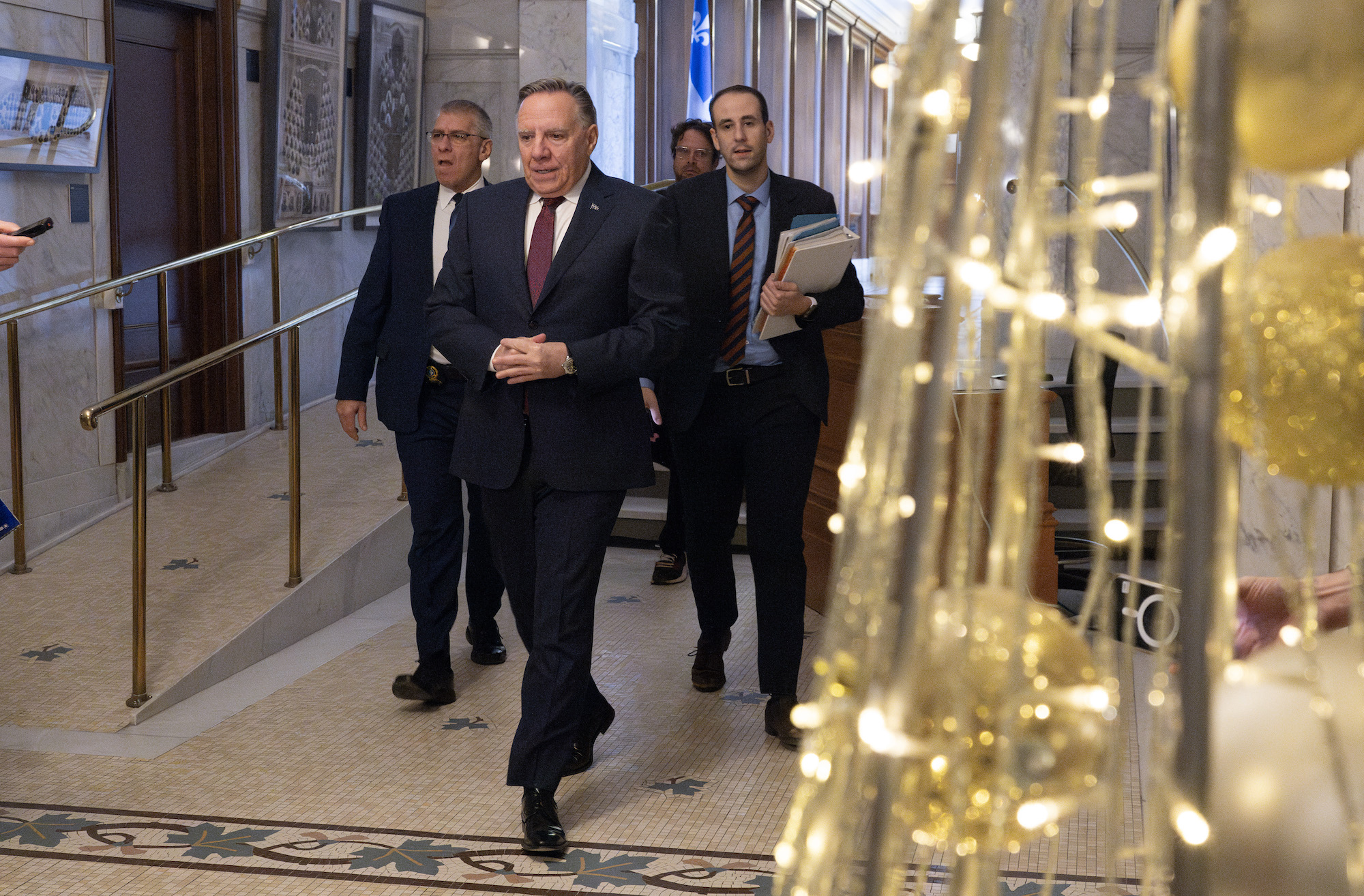On Friday, December 8, the fall sitting of Québec’s National Assembly officially came to a close after a week of intensive sittings to end the year. Premier Legault described 2023 as challenging for the CAQ government.
The first year following the CAQ’s re-election has been characterized by a growing criticism of the government, in part due to polarizing reforms and controversy, which has ultimately led to a drop in approval ratings for the CAQ and a considerable rise in support for the Parti Québécois according to pollsters.
Healthcare reform
Bill 15, An Act to make the health and social services system more effective, was introduced by Health Minister Christian Dubé in March 2023. The massive 1000+ article bill has occupied the majority of the agenda of the Commission on Health and Social Services this session. In an attempt to get the sweeping reform adopted before the National Assembly wrapped up for the year, Premier Legault invoked closure on the debates on December 8th, forcing members to complete the study and vote on the bill. The bill continues to draw criticism from groups representing healthcare workers and the English-speaking community.
The focal piece of the bill is the establishment of a new agency, Santé Québec, which will be set up in the six months following the adoption of the bill. The provincial government’s aim is for the agency to be operational in late 2024, but it could take two to three years for the full reforms to be implemented.
Energy + environment
Québec’s industrial strategies on innovation and energy transition have attracted the attention of major players in the automobile, battery, and renewable fuels sectors. The incoming major projects and decarbonization goals of the province have been top of mind for new Hydro Québec CEO Michael Sabia. In the crown corporation’s updated 5-year action plan, up to $185 billion in investments are foreseen by 2035 to keep up with the growing demand for electricity.
Minister Fitzgibbon has equally been occupied by the government’s energy transition goals. In mid-November the minister announced that 11 industrial projects with large-scale electricity needs were approved, representing 956 MW. This includes the Northvolt battery plant, which received provincial and federal funding in the fall. There is recognition within the ministry of economy, innovation and energy, and Invest Québec, that the grid’s capacity to support new projects is tightening. Despite this, Invest Québec still expects another $15 billion investments in Québec’s battery industry.
Education
Amid the adoption of Bill 23, Minister Drainville’s education reform, which was highly criticized and voted against by all members of opposition, continues the negotiation of a new collective agreement for the public sector, resulting in strikes since November 23 from the Fédération autonome de l’enseignement (FAE.) The common front workers, who work across the public sector, including in health care and education, followed suit on December 8 for a 7-day strike that may lead to a general unlimited strike if no deal is struck later this month. Meanwhile, English-language universities are grappling with uncertainty and declining enrolments following the government’s imposed increase of tuition for out-of-province students. McGill, Concordia and Bishop’s University are in negotiations with the province to find a compromise that would keep them competitive.
Immigration
In November, the CAQ government unveiled its updated immigration plan which set the province’s target number for permanent immigrants at 50,000 for 2024 and 2025, instead of the previously anticipated 60,000. The plan also included new rules requiring temporary foreign workers to pass a French test to stop the decline of the French language in Québec.
Other issues
- The Institut de la statistique du Québec reported that Québec’s real GDP shrank by 1.9 per cent on an annualized basis in September. The reasons behind the economic contraction were said to be a result of a decline in investment spending, a slowdown in inventory and a drop in household spending.
- Finance Minister Eric Girard had indicated in September that his main priorities would be tackling affordable housing issues and homelessness as well as continuing to position Québec to adapt to climate change. The minister had also specified there was no intent to contribute to inflation by handing out money and stated Québec’s fiscal policy should align itself with the Bank of Canada’s interest-rate policy. As such, the fall’s fiscal update included a $900 million investment in housing, matching the federal government’s investments for a total of $1.8 billion to be spent in the next five years, with a $1.5 billion portion to create 7500 affordable housing accommodations. Additionally, Québec committed to add $21 million in funding to food banks and $124 million to organizations focused on fighting homelessness.
- Bill 38, for cybersecurity and the digital transformation of public administration, was passed on December 5. This bill will allow the minister of digital government, access to information and data protection to identify priority projects to inform the government’s digital transformation and to administer pilot projects looking to study and experiment in the field.
- Bill 96, on French language reforms, has continued to make headlines despite being passed in 2022. A grace period for certain reforms ended in June 2023, forcing companies to implement mandatory French language policies for internal and external communications, this was extended to companies of 25 to 49 employees. Other elements of the bill will impose further francization requirements come into effect in 2025.
Political update
Premier Legault recently addressed and took accountability for the rising dissatisfaction with his government following the release of the latest Léger poll, mentioning his decision to drop plans to build an automobile tunnel under the St. Lawrence River between Québec City and Lévis, the 30 per cent raise in MNA’s salaries and the recently announced NHL game in Québec City, spending up to $7 million in public funds in the process. The results of the latest Léger poll conducted for Québecor media suggested the PQ would garner 31 per cent of the vote, with 25 per cent for the CAQ.

Moreover, the latest national poll by Angus Reid indicated that 31 per cent of the population say they approve of Legault, a 16-point decline over a three-month period, making him the premier with the lowest approval ratings in the country.

Update on Liberal Party Leadership timelines (Spring 2025)
The Québec Liberal Party announced it would not be choosing its new leader until spring 2025, over a year before the next Québec general election in 2026, on the last day of the party’s general council meeting. This decision came with criticism from some of the members of the party, citing that the election of a new leader sooner rather than later would have allowed the incumbent to establish themselves in the position and begin rebuilding the party.
Looking ahead
As it is often said in politics, the first years of a newly elected government are the time to demonstrate quick actions and success in the changes and reform you intend to deliver. The Legault-CAQ government was re-elected in October 2022 and will once again head to the polls in fall 2026. With an ambitious political agenda put forward, we will see if they have time to implement key promises like the health and education reforms, and restructure the energy production and distribution, so they can face the electorate with a positive balance sheet. Meanwhile, the opposition must find new leaders and the PQ will continue to stoke the nationalist cause.
Legislative update
- Bill-15: Adopted December 8, 2023, with a final vote of 75 to 26 on December 9.
- Bill 23: Assented December 7, 2023.
- Bill 29 (right to repair): Assented and came into force October 5, 2023.
- Bill 31 (rental agreements): Ongoing study; adoption in early 2024.
- Bill 30 (financial and insurance sector): Adoption in principle September 12, 2023.
- Bill 35 (Budget 2023 Implementation): Assented December 7, 2023.
- Bill 38 (management of information resources): Assented December 6, 2023.
- Bill 39 (municipal taxation): Assented December 8, 2023.
- Bill 40 (municipal court reforms): Assented December 7, 2023.
Consultations
- Québec Budget 2024 Consultations: Winter 2024.
- Reflection roundtables on the future of forests: Winter 2024.
- Consultation on the Strategy for the reduction and responsible management of plastics: November 15 to December 15, 2023.
- Consultation on preventive action to control the presence of contaminants in biosolids, including thresholds for PFAS: set to take place in 2024.
- National consultation on agricultural land and activities: ongoing.


